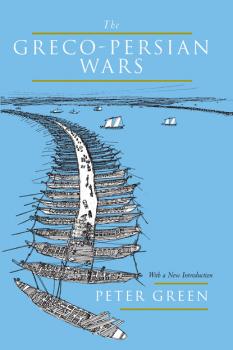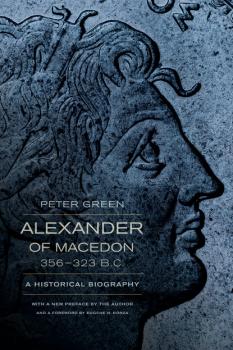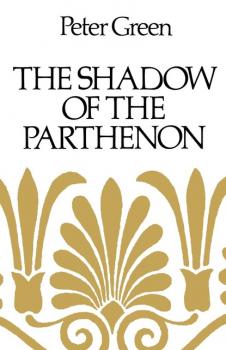ТОП просматриваемых книг сайта:















Peter Green
Список книг автора Peter GreenАннотация
This is a reissue, with a new introduction and an update to the bibliography, of the original edition, published in 1970 as </i>The Year of Salamis<i> in England and as </i>Xerxes at Salamis<i> in the U.S.<br /><br />The long and bitter struggle between the great Persian Empire and the fledgling Greek states reached its high point with the extraordinary Greek victory at Salamis in 480 B.C. The astonishing sea battle banished forever the specter of Persian invasion and occupation. Peter Green brilliantly retells this historic moment, evoking the whole dramatic sweep of events that the Persian offensive set in motion. The massive Greek victory, despite the Greeks' inferior numbers, opened the way for the historic evolution of the Greek states in a climate of creativity, independence, and democracy, one that provided a model and an inspiration for centuries to come.<br /><br />Green's accounts of both Persian and Greek strategies are clear and persuasive; equally convincing are his everyday details regarding the lives of soldiers, statesmen, and ordinary citizens. He has first-hand knowledge of the land and sea he describes, as well as full command of original sources and modern scholarship. With a new foreword, <i>The Greco-Persian Wars</i> is a book that lovers of fine historical writing will greet with pleasure.
Аннотация
The Hellenistic Age, the three extraordinary centuries from the death of Alexander in 323 B. C. to Octavian's final defeat of Antony and Cleopatra at the Battle of Actium, has offered a rich and variegated field of exploration for historians, philosophers, economists, and literary critics. Yet few scholars have attempted the daunting task of seeing the period whole, of refracting its achievements and reception through the lens of a single critical mind. <i>Alexander to Actium</i> was conceived and written to fill that gap.<br /><br />In this monumental work, Peter Green—noted scholar, writer, and critic—breaks with the traditional practice of dividing the Hellenistic world into discrete, repetitious studies of Seleucids, Ptolemies, Antigonids, and Attalids. He instead treats these successor kingdoms as a single, evolving, interrelated continuum. The result clarifies the political picture as never before. With the help of over 200 illustrations, Green surveys every significant aspect of Hellenistic cultural development, from mathematics to medicine, from philosophy to religion, from literature to the visual arts.<br /><br />Green offers a particularly trenchant analysis of what has been seen as the conscious dissemination in the East of Hellenistic culture, and finds it largely a myth fueled by Victorian scholars seeking justification for a no longer morally respectable imperialism. His work leaves us with a final impression of the Hellenistic Age as a world with haunting and disturbing resemblances to our own. This lively, personal survey of a period as colorful as it is complex will fascinate the general reader no less than students and scholars.
Аннотация
Until recently, popular biographers and most scholars viewed Alexander the Great as a genius with a plan, a romantic figure pursuing his vision of a united world. His dream was at times characterized as a benevolent interest in the brotherhood of man, sometimes as a brute interest in the exercise of power. Green, a Cambridge-trained classicist who is also a novelist, portrays Alexander as both a complex personality and a single-minded general, a man capable of such diverse expediencies as patricide or the massacre of civilians. Green describes his Alexander as «not only the most brilliant (and ambitious) field commander in history, but also supremely indifferent to all those administrative excellences and idealistic yearnings foisted upon him by later generations, especially those who found the conqueror, tout court, a little hard upon their liberal sensibilities.»<br /><br />This biography begins not with one of the universally known incidents of Alexander's life, but with an account of his father, Philip of Macedonia, whose many-territoried empire was the first on the continent of Europe to have an effectively centralized government and military. What Philip and Macedonia had to offer, Alexander made his own, but Philip and Macedonia also made Alexander form an important context for understanding Alexander himself. Yet his origins and training do not fully explain the man. After he was named hegemon of the Hellenic League, many philosophers came to congratulate Alexander, but one was conspicuous by his absence: Diogenes the Cynic, an ascetic who lived in a clay tub. Piqued and curious, Alexander himself visited the philosopher, who, when asked if there was anything Alexander could do for him, made the famous reply, «Don't stand between me and the sun.» Alexander's courtiers jeered, but Alexander silenced them: «If I were not Alexander, I would be Diogenes.» This remark was as unexpected in Alexander as it would be in a modern leader.<br /><br />For the general reader, the book, redolent with gritty details and fully aware of Alexander's darker side, offers a gripping tale of Alexander's career. Full backnotes, fourteen maps, and chronological and genealogical tables serve readers with more specialized interests.
Аннотация
A lively combination of scholarship and unorthodoxy makes these studies in ancient history and literature unusually rewarding. Few of the objects of conventional admiration gain much support from Peter Green (Pericles and the «democracy» of fifth-century Athens are treated to a very cool scrutiny) but he has a warm regard for the real virtues of antiquity and for those who spoke with «an individual voice.»<br /><br />The studies cover both history and literature, Greece and Rome. They range from the real nature of Athenian society to poets as diverse as Sappho and Juvenal, and all of them, without laboring any parallels, make the ancient world immediately relevant to our own. (There is, for example, a very perceptive essay on how classical history often becomes a vehicle for the historian's own political beliefs and fantasies of power.) <br /><br />The student of classical history will find plenty in this book to enrich his own studies. The general reader will enjoy the vision of a classical world which differs radically from what he probably expects.




